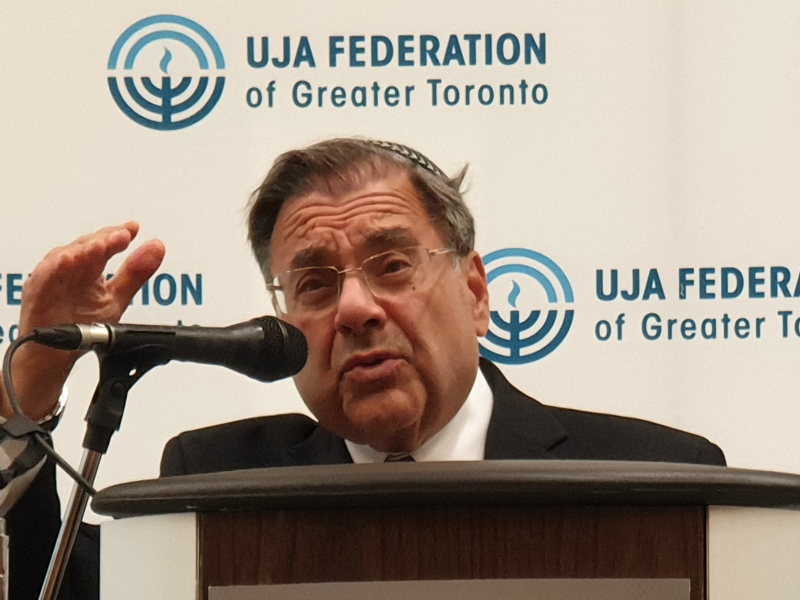One of the world’s most respected Jewish leaders sees three broad areas that divide Jews today, two of which he says are ongoing and serious, while the third might soon come to an end.
In an impassioned talk in Toronto on June 24, Rabbi Shlomo Riskin, chief rabbi of the West Bank town of Efrat, discussed rifts in the Jewish world and how they can be repaired.
Rabbi Riskin sees a tempering in the importance of the Holocaust, “difficult” strains of liberalism in the U.S. Democratic party, and the ultra-Orthodox control of Israel’s politics and religious life as main causes of divisions in the Jewish world – although he believes the last factor is drawing to a close.
In the wake of the Holocaust, “there was one reality that was very clear to the Jewish people: they had to have a Jewish nation-state,” he said. “They had to have safe borders. They had to be protected from enemies. There could never again be another Holocaust.”
All Jews, religious and secular, left and right, understood that, he said. “It didn’t have to be explained.”
But time “dulls memory. People have forgotten the importance of Israel” and are “too removed from the Holocaust.” “Most” millennials have not been exposed to the Holocaust, he added. The memory of the Holocaust and its importance have been “completely” taken for granted.
READ: LIBERAL MPS DISCUSS GOVERNMENT’S NEW ANTI-RACISM STRATEGY
He warned that new dangers have emerged in the U.S. Democratic party, which has become “exceedingly liberal,” with sympathy for a perceived underdog: Palestinians.
He cited Rep. Ilhan Omar, who has raised the canard of American Jews having dual loyalties, and Rep. Alexandria Ocasio-Cortez, who has advocated cutting U.S. aid to Israel, among other controversial statements about Jews and Israel.
As for some views that Jews are not willing to share Israel, Rabbi Riskin said he’s even willing to give up part of his own town for peace. “And I’m a settler. I’m supposed to be an extremist.”
“Misled” liberals, especially in America, are “very problematic,” he added, while rising anti-Semitism puts Jews “in a very difficult position worldwide.”
But on his last point, Rabbi Riskin sounded sanguine, and added a message of Jewish unity.
While Conservative and Reform Jews have been “delegitimized” by Israel’s chief rabbinate, “we are blood brothers,” he said. Non-Orthodox Jews “are not my enemies. They are my partners. Both of us are trying to make better Jews.
“We are one people and we must be one people.”
He said he’s confident that a major rift in Judaism – the ultra-Orthodox political influence and monopoly on religious life in Israel – will soon end. Israel’s ultra-Orthodox rabbinic leadership “is not leading. Its time is ending,” said Rabbi Riskin, who identifies as modern Orthodox.
Israeli Prime Minister Benjamin Netanyahu has needed ultra-Orthodox parties to prop up his government coalitions, trading positions of power to gain their support. But since Rabbi Riskin feels Netanyahu won’t be re-elected in September, he said the situation “is coming to an end. It should come to an end.”
He noted that under Israel’s Law of Return, all Jews have every right to be in Israel. “At the end of the day, we must be one people. We must respect each other.”
Asked how to deal with pro-Palestinian Jews, Rabbi Riskin said, “I’m pro-Palestinian.” He said he has excellent relations with Palestinians in villages near his, including allowing their use of emergency medical services in Efrat.
As if to underscore Rabbi Riskin’s message of Jewish unity, the event, which was sponsored by UJA Federation of Greater Toronto, was attended by Orthodox, Conservative and Reform rabbis, and co-chaired by Rabbi Chaim Strauchler of Shaarei Shomayim Congregation and Rabbi Michael Dolgin of Temple Sinai.
